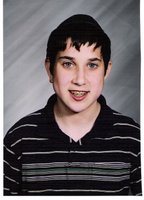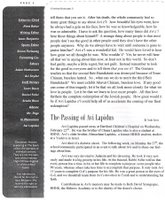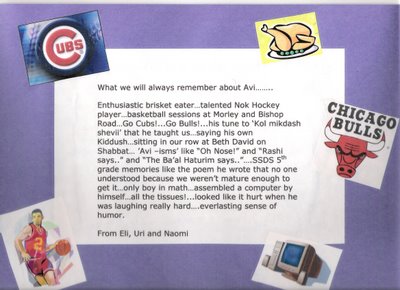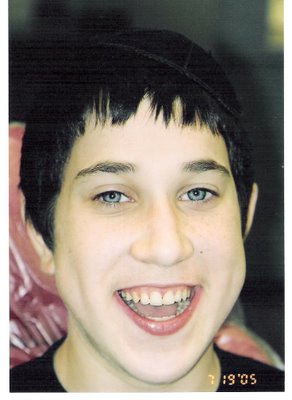[Explanatory notes: "d'var Torah" means "a word of Torah," such as a sermonette. "Mikeitz" is the first key word in Hebrew of the week's Torah reading, Genesis 41:1-44:17.]
(Delivered at Beth David Synagogue, West Hartford, CT.)
Shabbat Shalom. This morning, we read from two Torah scrolls. From the first we read our weekly parashah. From the second we read a special maftir in celebration of the last day of Chanukah.
Our parshah today is Mikeitz, and as the story opens we find Pharaoh troubled by two vivid dreams that he has in one night. The first dream starts off with a vision of seven fat and healthy cows standing by the Nile River. Then, seven lean, rotten-looking cows come and eat the good cows. The vision startled Pharaoh; he woke up and then went back to sleep, only to have a second dream about seven healthy ears of grain about to be engulfed by seven spoiled ears of grain. Joseph, who had been in prison for twelve years, was called upon to interpret the dreams. Joseph’s capacity to understand dreams had already been proven by his accurate explanations of the dreams of his cellmates in prison. At the sight of Pharaoh’s distress, the wine butler recalled the day that Joseph foretold of his impending freedom. Joseph was summoned from the pit, cleaned up and dressed up, and brought into the royal chambers. He proclaimed that the dreams envisioned that there would be seven years of plenty in Egypt, and seven years of famine in all of the land after that.
Rashi says that there is another true interpretation to Pharaoh’s dream, one not mentioned in the Torah. This Rashi is commenting on chapter 41, verse 8: “And it was in the morning, and his spirit was troubled, so he sent and called all of the magicians of Egypt, and all its sages, and Pharaoh told them the dreams; but they did not have an interpretation for Pharaoh.” What does it mean, “for Pharaoh?” Rashi says it means that there had been a correct interpretation, but Pharaoh was not satisfied with it. His magicians had told him that the dreams were talking to the destinies of seven daughters, all of whom Pharaoh would outlive. This eventually did come to pass. From here we see that there were two interpretations to Pharaoh’s dream, and both were accurate.
But Rashi’s answer leads to many questions. How could there be two completely different interpretations to one statement? Why was Pharaoh not satisfied with the necromancers’ answers? Why did the magicians not mention the famine? Why did Pharaoh believe Joseph, the prisoner, the slave, the young man, the Hebrew?
In seeking an answer to these questions, we can highlight the essence of proper Torah study. The Torah is not studied in one dimension. It is interpreted in four levels: peshat, remez, derash, and sod. Their initial letters spell “pardes.” Peshat is the basic understanding of Biblical text. Remez is the next level down through which the hints of deeper understanding can be extracted. Derash is yet a deeper level at which Talmudic and Rabbinic Judaism find their vibrancy. Sod, the deepest level, goes to the roots of spiritual knowledge. It is hidden from all except the most learned of scholars. As a word, “pardes” can mean orchard; yet in Torah study, it refers to the harvesting of knowledge that can be the result of sincere reflection and consideration. So too here, this one idea contains two different answers. Their being different did not make one exclusive of the other. The Egyptian advisors came forth from their perspectives, while Joseph brought a different way of thinking to the same issue.
Pharaoh did not accept the “seven daughters” interpretation and accepted Joseph’s answer because of timeliness. His personal cook had recommended Joseph when Pharaoh was in desperation. Could it be that among the prisoners, among the Hebrews, there would be a man of such wisdom? Pharaoh acknowledged that Joseph was also under stress as well. This was Joseph’s chance to escape from jail, to live a better life, to live the life of a king. This added to the reason of why Pharaoh accepted Joseph.
But that is not the only reason why Pharaoh was eager to heed to his words. Joseph was convincing to Pharaoh. He played into Pharaoh’s book. Joseph entered into Pharaoh’s throne saying, “God will answer you.” He had said that to please Pharaoh. He explained everything to Pharaoh. He explained what the dream meant. He answered why the dream had occurred twice. He proposed a plan that would greaten Pharaoh’s name. Joseph told Pharaoh that he should store all of the food for now. Then, during the famine, the whole world would come to him and sacrifice all of their riches for food. Then Pharaoh would be the wealthiest man in the world.
The magicians did not receive the interpretation because, according to the Tosafos (a school of scholars that lived about eight-hundred years ago), the angel that narrated the dream spoke in Hebrew. Since the dream was performed in Hebrew, the angel that narrated the dream spoke in Hebrew. The Tosafos explained that since the Egyptian necromancers did not understand the truth of the Hebrew dream, as they do not speak Hebrew.
The Maharal of Prague, in his supercommentary on Rashi, which he entitled Gur Aryeh, explains why Pharaoh was not satisfied with the magicians’ interpretation. He explains that Pharaoh’s spirit was troubled because he did not understand his dream. After the magicians gave their interpretations, Pharaoh’s spirit was still troubled. So he realized that the interpretations of the magicians were not the real, or possibly not the only message. Tosafos also gives an answer that since Pharaoh dreamed his dream with its interpretation and then forgot its interpretation; he had to be reminded of it and was only satisfied with the interpretation he had seen in his dream.
I would like to thank my Mom for guarding me and taking care of me my entire life. I would like to thank my Abba for helping me prepare for his love and for helping me prepare for my bar mitzvah ceremony, and for working for me in the house and at his business. My Abba taught me the Torah reading, the haftorah, and the davening. I would like to thank Menachem for bringing me closer to Yiddishkeit and Chana for keeping me busy when there’s nothing to do. I would like to thank Rabbi Adler for all his help involved in my Bar Mitvzah. I would also like to thank my friends and relatives who were able to join me in this simcha. Especially, that my Bubbe came from Chicago to be with me as she did thirteen years ago. I wish my Zaide could be here, but he is not well enough to travel.
Years ago, the Syrian Greeks tried to take away our pardes, our paradise. They tried to take away our Temple; they tried to take away our laws; they tried to take away our religion. On this very day, we commemorate how we conquered the yevanim and took back our paradise. We pray that one day, moshiach will come and return us to our paradise once more. Shabbat Shalom and Chag Sameach!



















